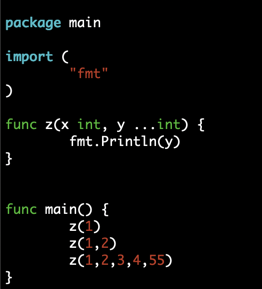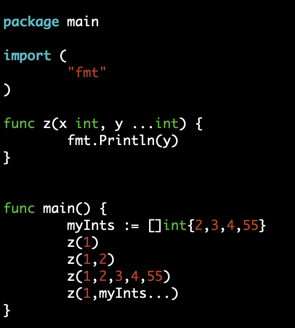Variadic Functions
05/17/21 07:47 Filed in: GO
Variadic Functions
Certain functions can take a variable number of arguments. These functions are known as variadic functions. fmt.Println is such a function.
fmt.Println("A")
fmt.Println("A","1","3","@","X",".","COM")
Most functions only take the number of arguments matching the number of parameters in the function signature.
func z(x int, y int)
for example, can only accept to arguments.
z(1,2)
Variadic functions, such as Println, have a special last parameter.
func z(x int, y …int)
The three periods before the last parameter type mark this as a variadic function. NOTE: This is/are three periods … and not an ellipsis character. The function can now take any number of arguments, the last one is returned as a slice. Here is what it looks like in action.


As you can see if I omit the variadic argument, the parameter returns an empty slice.
A couple of things to note:
- The variadic parameter must be the last one in the signature, and "There can only be one."
- The parameters passed to the variadic parameter must be of the same time as the data type of the variable. In the above example, I can't mix strings into the list of parameters. I'll get an error.
Once I have the slice, I can do whatever I want with it.
I can also pass a slice to the variadic parameter. To do this I have append the three periods after the slice I pass in. In the final line of main(), I pass in a slice as:
myInts…


So, the thing I need to remember is that when I pass in multiple items to the variadic parameter, the function treats them as a slice. When I pass a slice into the parameter, I don't get a slice containing another slice; I just get the same slice back. If I pass a slice in, I get the same thing out.
That's it for today. I don't use variadic functions often, but when I need them, it's nice to know how to use them.